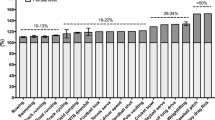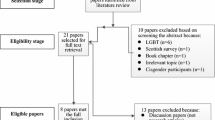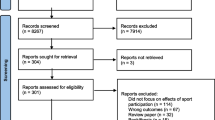Abstract
Sportswomen live in 2 cultures: the sport culture that is inherently masculine and the larger social culture where femininity is celebrated for women. In this investigation, which was grounded in feminist cultural studies, we pursued the research question: how do female athletes negotiate and reconcile the social expectations surrounding femininity with athleticism? Twenty-one female college athletes participated in focus group interviews about body image and perceptions of muscularity and femininity. Data analysis resulted in 3 higher order themes: the influence of hegemonic femininity, athlete as other, and physicality. These athletes expressed that being feminine contrasted with being athletic. They further conveyed that as athletes, they were marginalized and perceived as different from “normal” women. Yet, they also were proud of their strong, developed bodies and expressed feelings of empowerment that generalized beyond the sport context.
Similar content being viewed by others
references
Baird, S. (2001). Femininity on the pitch: An ethnography of women's rugby. Unpublished master's thesis, Bowling Green State University, Ohio.
Barker, C. (2002). Making sense of cultural studies: Central problems and critical debates. Thousand Oaks, CA: Sage.
Bartky, S. L. (1990). Femininity and domination: Studies in the phenomenology of oppression. New York: Routledge.
Blinde, E. M., & Taub, D. E. (1992). Women athletes as falsely accused deviants: Managing the lesbian stigma. Sociological Quarterly, 33, 521-533.
Bordo, S. (1993). Unbearable weight: Feminism, Western culture, and the body. Berkeley: University of California Press.
Braun, V. (2000). Heterosexism in focus group research: Collusion and challenge. Feminism and Psychology, 10, 133-140.
Butler, J. (1990). Gender trouble: Feminism and the subversion of identity. New York: Routledge.
Choi, P. Y. L. (2000). Femininity and the physically active woman. London: Routledge.
Chow, R. (1999). When Whiteness feminizes ...: Some consequences of a supplementary logic. Differences, 11(3), 137-168.
Cole, C. L. (1993). Resisting the canon: Feminist cultural studies, sport, and technologies of the body. Journal of Sport and Social Issues, 17, 77-97.
Crawley, S. L. (1998). Gender, class and the construction masculinity in professional sailing. International Review for the Sociology of Sport, 33, 35-41.
Dewar, A. (1993). Would all the generic women in sport please stand up? Challenges facing feminist sport sociology. Quest, 45, 211-229.
Duncan, M. C. (1994). The politics of women's body images and practices: Foucault, the panopticon, and Shape magazine. Journal of Sport and Social Issues, 18, 48-65.
Duquin, M. E. (1994). The body snatchers and Dr. Frankenstein revisited: Social construction and deconstruction of bodies and sport. Journal of Sport and Social Issues, 18, 268-281.
Ely, M. (1991). Doing qualitative research: Circles within circles. Philadelphia: Falmer Press.
Etu, E., & Williams, M. K. (1996). On the edge: Women making hockey history. Toronto: Second Story Press.
Fonow, M. M., & Cook, J. A. (1991). Back to the future: A look at the second wave of feminist epistemology and methodology. In M. M. Fonow & J. A. Cook (Eds.), Beyond methodology: Feminist scholarship as lived research (pp. 1-15). Bloomington: Indiana University Press.
Frow, J., & Morris, M. (2000). Cultural studies. In N. K. Denzin & Y. S. Lincoln (Eds.), Handbook of qualitative research (2nd ed., pp. 315-346). Thousand Oaks, CA: Sage.
Halbert, C. (1995). Tough enough and woman enough: Stereotypes discrimination and impression management among women professional boxes. Journal of Sport and Social Issues, 21, 7-36.
Hall, M. A. (1996). Feminism and sporting bodies: Essays on theory and practice. Champaign, IL: Human Kinetics.
Hargreaves, J. A. (1993). Sporting females: Critical issues in the history and sociology of women's sports. New York: Routledge.
Heywood, L. (1998). Bodymakers: A cultural anatomy of women's body building. New Brunswick, NJ: Rutgers University Press.
Holliday, R., & Hassard, J. (2001). Contested bodies: An introduction. In R. Holliday & J. Hassard (Eds.), Contested bodies (pp. 1-17). New York: Routledge.
Holt, N. L., & Sparkes, A. C. (2001). An ethnographic study of cohesiveness in a college soccer team over a season. The Sport Psychologist, 15, 237-259.
Johns, D. (1996). Fasting and feasting: Paradoxes of the sport ethic. Sociology of Sport Journal, 15, 41-63.
Kolnes, L. J. (1995). Heterosexuality as an organizing principle in women's sport. International Review for Sociology of Sport, 30, 61-79.
Krane, V. (1997). Homonegativism experienced by lesbian collegiate athletes. Women in Sport and Physical Activity Journal, 6(1), 141-163.
Krane, V. (2001a). “We can be athletic and feminine,” but do we want to? Challenges to femininity and heterosexuality in women's sport. Quest, 53, 115-133.
Krane, V. (2001b). One lesbian feminist epistemology: Integrating feminist standpoint, queer theory, and feminist cultural studies. The Sport Psychologist, 15, 401-411.
Krane, V., Greenleaf, C., & Snow, J. (1997). Reaching for gold and the price of glory: A motivational case study of a former elite gymnast. The Sport Psychologist, 11, 53-71.
Krane, V., Stiles-Shipley, J., Waldron, J., & Michalenok, J. (2001). Relationships among body image, and eating and exercise behaviors in female athletes and aerobic exercisers. Journal of Sport Behavior, 24, 1-18.
Krane, V., Waldron, J., Michalenok, J., & Stiles-Shipley, J. (2001). Body image, and eating and exercise behaviors: A feminist cultural studies perspective. Women in Sport and Physical Activity Journal, 10(1), 17-54.
Krueger, R. A. (1998). Moderating focus groups. Thousand Oaks, CA: Sage.
Kvale, I. (1996). Interviews: An introduction to qualitative research interviewing. Thousand Oaks, CA: Sage.
Lenskyj, H. J. (1994). Sexuality and femininity in sport context: Issues and alternatives. Journal of Sport and Social Issues, 18, 356-376.
Madriz, E. (2000). Focus groups in feminist research. In N. K. Denzin & Y. S. Lincoln (Eds.), Handbook of qualitative research (2nd ed., pp. 835-850). Thousand Oaks, CA: Sage.
Markula, P. (1995). Firm but shapely, fit but sexy, strong but thin: The postmodern aerobicizing female bodies. Sociology of Sport Journal, 12, 424-453.
Marten-DiBartolo, P., & Shaffer, C. (2002). A comparison of female college athletes and nonathletes: Eating disorder symptomatology and psychological well-being. Journal of Sport and Exercise Psychology, 24, 33-41.
Miller, K. E., Sabo, D. F., Farrell, M. P., Barnes, G. M., & Melnick, M. J. (1999). Sports, sexual behavior, contraceptive use, and pregnancy among female and male high school students: Testing cultural resource theory. Sociology of Sport Journal, 16, 366-387.
Morgan, D. L. (1988). Using focus groups as qualitative research (Sage University Paper Series on Qualitative Research Methods, Vol. 16). Newbury Park, CA: Sage.
Pirinen, R. M. (1997). The construction of women's positions in sport: A textual analysis of articles on female athletes in Finnish women's magazines. Sociology of Sport Journal, 14, 290-301.
Rail, G. (1992). Physical contact in women's basketball: A phenomenological construction and contextualization. International Review for the Sociology of Sport, 27, 1-27.
Russell, K. (2002). Women's participation motivation in rugby, cricket, and netball: Body satisfaction and self identity. Unpublished doctoral dissertation, Coventry University, Coventry, UK.
Strauss, A., & Corbin, J. (1990). Basics of qualitative research: Grounded theory procedures and techniques. Newbury Park, CA: Sage.
Strauss, A. L. (1987). Qualitative analysis for social scientists. Cambridge, UK: Cambridge University Press.
Theberge, N. (1997). “It's part of the game:” Physicality and the production of gender in women's hockey. Gender and Society, 11, 69-87.
Ussher, J. M. (1997). Fantasies of femininity: Reframing the boundaries of sex. New Brunswick, NJ: Rutgers University Press.
Wilkinson, S. (1998). Focus groups: A feminist method. Psychology of Women Quarterly, 23, 221-244.
Wright, J., & Clarke, G. (1999). Sport, the media and the construction of compulsory heterosexuality. International Review for the Sociology of Sport, 34, 227-243.
Young, K. (1997). Women, sport, and physicality. International Review for the Sociology of Sport, 32, 297-305.
Author information
Authors and Affiliations
Corresponding author
Rights and permissions
About this article
Cite this article
Krane, V., Choi, P.Y.L., Baird, S.M. et al. Living the Paradox: Female Athletes Negotiate Femininity and Muscularity. Sex Roles 50, 315–329 (2004). https://doi.org/10.1023/B:SERS.0000018888.48437.4f
Issue Date:
DOI: https://doi.org/10.1023/B:SERS.0000018888.48437.4f




